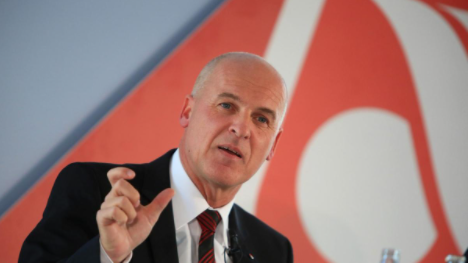Weaker carriers are likely to exit the market with possibly more regulation setting into the industry post the pandemic
The airline industry will see a revival of local and regional travel before long-haul routes rebound, in line with International Air Transport Association estimates of a full recovery in 2024, with the market set for consolidation, according to Royal Jordanian’s outgoing chief executive.
“In terms of market segments, we would expect to see the visiting of friends and family come back first, followed by tourism and the business travel will probably take a longer time to come back to 2019 levels,” Stefan Pichler, who stepped down from his post last month to retire, told The National.
“Having said this, I would assume that both Emirates and Etihad as connecting network airlines are in a pretty good position to use the current crisis and the recovery patterns to their advantage. Some other airlines with a stronger focus on point to point traffic will suffer for a longer period of time. If they survive,” added Mr Pichler, who is known for having turned airline fortunes around.
The Covid-19 pandemic has brought the global travel and tourism industries to a near-halt and tipped the global economy into a recession. Many airlines have either furloughed their workers or cut jobs to deal with the pandemic. Some 4.8 million industry jobs have been lost or are under threat as countries restrict air traffic to prevent the spread of the pandemic.
Many carriers have received billions of dollars in state aid but are increasingly facing operational challenges due to a weak travel outlook amid the coronavirus pandemic. In September, Iata cut its forecast for this year’s traffic growth to an average decline of 66 per cent year-on-year, compared with a previous estimate of 63 per cent.
Mr Pichler, 63, said the landscape of aviation and the travel industry will change post-Covid with further consolidation and weaker airlines exiting markets.
“We might also see a bit more regulation in our industry as the governments of most of the countries had to bail out their airlines to save jobs, infrastructure and market access as well as ensure future GDP development,” he said. “And, with the bailout money, you buy influence. And, finally, work from home will also be one of the future operating options for airlines as it worked out quite well in some areas during the crisis. This will go in parallel with more outsourcing of non-core airline functions.”
The seasoned executive has led six airlines in the last nearly 25 years, including airberlin, Fiji Airways, Jazeera Airways in addition to being at the helm of Thomas Cook Group.
“Some of it was about growth, but some of them were ready for immediate turnaround,” Mr Pichler, said regarding his past experience. “Some of them, like Jazeera Airways, were great low-cost airlines, some, like Thomas Cook were more legacy. So, it has been an exciting journey not only through different business models, but also through different cultures.”
The main takeaway from a wide-spanning and successful career as a chief executive, he said, is being forthcoming and in touch with the people across the organisational ladder.
“If you start your business career, most of the time you focus on your functional expertise and the numbers to guide your decisions. People sometimes tend to lie, numbers don’t,” Mr Pichler said.
“If you lead companies as a CEO, in reality you lead people much more than you manage numbers,” he added. “And, interestingly, the need of human beings to be respected, to have nice colleagues at work and a stimulating work environment are the same all over the globe. So, the biggest lesson for me was that in order to achieve anything in my job, I have to be truthful, real and inclusive to and with all the people I was working with.”




